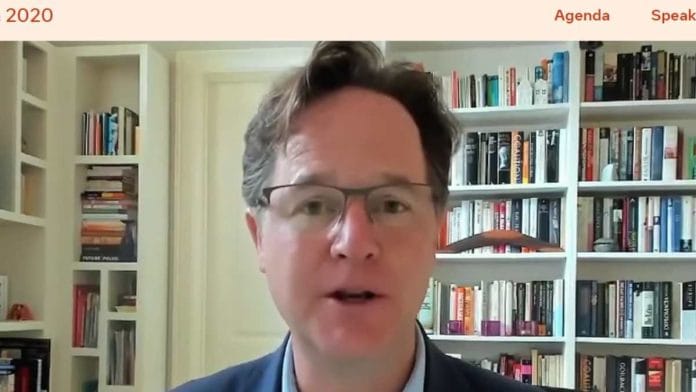New Delhi: Even as Facebook continues to draw flak for not doing enough to control hate speech on its platform, a senior executive of the social media giant Tuesday said the company is “under tremendous political pressure” to manage content, especially hate speech, particularly when it’s not illegal.
“When it comes to hate speech, and particularly speech which is not illegal… Facebook is a company being put under tremendous political pressure, whether it’s in India or elsewhere, by people who have different views and often conflicting views about what should and shouldn’t be circulating freely on the internet even though it is legal,” said Nick Clegg, Facebook global affairs and communications vice-president.
Clegg, who has previously served as the deputy prime minister of the United Kingdom, was responding to a query from Carnegie India director Rudra Chaudhuri during an online discussion at a two-day Facebook event, ‘Facebook Fuel for India 2020’.
Other speakers at the event are Reliance Industries chairman Mukesh Ambani, Facebook CEO Mark Zuckerberg, and Karan Bajaj, the founder-CEO of edtech platform WhiteHat Jr, among others.
Also read: Facebook turned blind eye to BJP leader’s hate speech to protect its business, says WSJ report
Govts should ‘hold companies like Facebook accountable’
Claiming that it removes “huge amounts of content”, Clegg shared how Facebook manages content moderation.
He said Facebook has artificial intelligence (AI) systems that proactively detect hate speech in 45 languages globally, including in Indian languages, and removes content 98-99 per cent of the time before anyone reports it.
In addition, Facebook has since 2016 tripled the team size and now has over 35,000 people working to maintain security, integrity on the platform, Clegg, adding that the social media giant is also working on monitoring for content that could lead to offline harm.
Facebook has set up the Oversight Board as an independent body to help in deciding “what to take down, what to leave up and why”.
Asked about how India should evolve its regulatory framework for internet, privacy and data, Clegg said an effective approach to regulations would be one “that doesn’t seek to try and micromanage every post and every line of content online, that is impossible for governments to do”.
Clegg said governments should instead “hold companies like Facebook accountable and to insist on a high-level of transparency for the systems and policies they have in place”.
He added that regulations should also not “hinder the way in which the international economy now relies on international data flows”.
India has been pushing for data localisation, which would restrict data flowing out of India. Foreign companies in the past have said strict data localisation will affect their businesses.
Also read: Grilled by IT parliamentary panel on hate speech, Facebook India head says company is neutral






